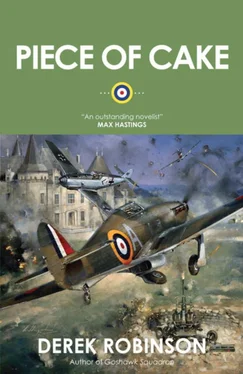The Ram let the Hurricane run off most of its speed, and then used the brakes to swing the nose from side to side until he found him. Kellaway was still standing on his own, near the perimeter fence. The Ram turned toward him and gave the engine a hint of throttle. As long as the massive, uprearing nose of the Hurricane blotted out the adjutant’s figure, he knew that he was heading the right way. The Ram taxied briskly across the grass, rehearsing in his mind the orders that would send the adjutant hurrying to the telephone: Listen, I’ve decided to chop three of these useless buggers and I want you to—
With a jolt that made his teeth click, the Hurricane’s wheels hit a slit-trench and the plane tripped itself up. The nose dug hard into the turf, its momentum hoisted the fuselage like a heavy flagpole, and the Ram found himself hanging in his straps, looking down the cowling at fragments of propeller sticking out of the grass.
He swore, savagely. He was not hurt, was not even stunned; but he was acutely aware of how foolish he must look. The rest of the squadron was coming in to land. It was imperative that he get out of this humiliating position at once. The last thing he wanted was to be rescued, manhandled to safety by the men he commanded. He could hear people shouting. There was no time to lose.
He disconnected the radio and oxygen leads, released his safety-straps, and got his feet onto the instrument panel. After that it was a matter of swinging his legs over the side and dropping to the ground.
The radio lead was a damn nuisance. It kept knocking him in the face. He flung it away but it bounced back and hit him in the eye.
A patient man would have ignored it, or tied it to something. The Ram grabbed it and hung from it. He had maneuvered all of his body except an arm and a foot outside the cockpit, when the radio lead popped out of its socket. The Ram’s free hand scrabbled uselessly at the Perspex canopy.
It was a drop of only ten feet; but the Ram was a heavy man in full flying-kit plus parachute, and he landed on the back of his head. The impact snapped the third and fourth cervical vertebrae.
Before he fell, groundcrew were running toward him with ladders. Hector Ramsay could never wait. It was the death of him.
The adjutant was on the telephone when Fanny Barton came into his office.
“Well, see if you can give me a couple of minutes with him, would you?” he said. He covered the mouthpiece and whispered: “Air Ministry. Frightfully busy. Flap on.” Fanny sat on the edge of the desk. He was still in flying overalls and boots.
“Ah, good morning, sir,” Kellaway said. “It’s about the CO, Squadron Leader Ramsay… I’m afraid he’s dead, sir. A flying accident. He fell out of his Hurricane…” Kellaway swung his feet onto the desk and listened to the voice from Air Ministry. “Oh no, nothing wrong with his parachute, sir. You needn’t…” He listened some more, picking his teeth with a matchstick. “Well, to be strictly accurate, sir, he wasn’t technically airborne at the time…” Kellaway listened, and rolled his eyes at Barton. “Put that way, sir,” he said, “you’re right, it wasn’t a flying accident at all… Mmm…” Kellaway heaved a sigh. “Damned if I know what I’d call it, sir. But call it what you will, it’s still a broken neck, isn’t it, and…”
Barton heard angry words being spoken. Eventually Kellaway replaced the telephone. “He wants to know where we think he’s going to find another CO on a Sunday morning. Do we think Air Ministry is some kind of domestic employment agency? Would we like half-a-dozen housemaids and a couple of butlers? Don’t we realize the balloon is about to go up?”
“Is it?” Barton asked.
Kellaway looked at his watch. “Come on,” he said. “The Prime Minister’s going to say something on the wireless in ten minutes. By the way, Fanny: you’re senior man, so you’re in charge of the squadron for the time being.”
They walked from the administrative block to the officers’ mess. It was a calm, quiet morning. Swallows and housemartins flashed and flickered between the buildings. The bells of Kingsmere church sounded clear but small. Their miniature clamor ended and a single bell began to toll.
“Poor old Ram,” Barton said.
“I canceled the rugger match, by the way.”
“Yes, of course… It’s so peculiar that he turned off and taxied into that trench. I wonder why?”
The adjutant shrugged. “Peculiar things happen. I remember once a chap was sitting on his tractor mowing the aerodrome when a plane taxied past and the wingtip cut his head off. Sheared it off at the neck, clean as you like. Tractor went on, mowing away, and the pilot took off. Didn’t know what he’d done. Wouldn’t believe it when he landed, thought we were pulling his leg. We had to show him the head. Chap called Blackmore, Nigger Blackmore. He wasn’t a nigger, of course; that was just what we called him.” They walked in silence for a while. “No reason why a nigger couldn’t fly a plane, I suppose,” the adjutant remarked. “Stranger things have happened.”
“I’ve just realized,” Barton said. “I shall have to appoint someone acting flight commander.”
“Yes. And you’ll have to write to the Ram’s next-of-kin, too.”
Barton hadn’t thought of that, and he didn’t fancy the idea. “What on earth am I going to say?” he asked.
“Tell them he died while leading his squadron in circumstances of unusual hazard,” Kellaway said. “Tell them he exhibited a complete disregard for his own personal safety.” They went up the steps of the mess.
Nothing much happened at Kingsmere on the rest of the first day of the Second World War. The squadron—like every other unit of the Royal Air Force—was placed on alert. There were a couple of false alarms, but no attack came. The pilots hung about the mess and grew bored. There was a general feeling of relief that at last the decision to fight had been made, but there was no exultation. This was partly because the Ram’s death had left them in the lurch: just when they needed some leadership, their leader was no more. Yet nobody mourned him. Nobody really missed him. It was as if his shingles had recurred and he had gone back to hospital in Torquay, instead of into the station mortuary.
Fanny Barton put Sticky Stickwell in command of “A” flight and made Pip Patterson Yellow Leader. It was the obvious thing to do: Stickwell had more flying time than the others. All the same, Barton worried about it. He worried about the lack of action, too. Every hour he telephoned Group operations room.
“Still no plots on the table, old boy,” Group said.
“Not much of a war, is it? My chaps are bored rigid.”
“Give the Hun a chance. It’s a long way from Germany, you know. Anyone at your end doing the Sunday Times crossword, by any chance?”
“They’re all outside, playing cricket.”
“Pity. Three down’s got me really stumped.”
Barton joined Flip Moran, who was leaning out of a window. “Bad news,” Barton told him. “Group ops are having trouble with the crossword.”
Moran grunted. Together they watched as Fitz Fitzgerald, clumsy in flying-boots, ran up and lobbed a tennisball at Moke Miller, who flailed and missed.
“I keep thinking I ought to be doing something,” Barton said.
“You are. You’re waiting.”
“I mean, as squadron commander.”
“You’re in charge of the waiting.” Moran’s Ulster accent was rich and slow, and touched with mockery. “That’s a heavy responsibility, Fanny. It’s not everyone could make a success of it.”
Fitz bowled again. This time Moke slashed at the ball and sliced it straight at Pip Patterson, who was standing drowsing in the warmth. He dropped the catch.
Читать дальше












